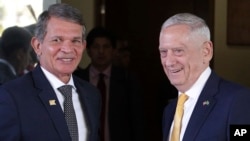United States Defense Secretary Jim Mattis spoke in Brazil Tuesday calling for closer ties with the country in defense issues and in space.
Mattis urged military students in Rio de Janeiro to remember Brazil’s long tradition of working with the U.S. military since World War II.
The defense secretary’s visit comes at a time when unrest continues to increase in Venezuela and several of the area’s economies are struggling. The U.S. also is concerned about the growing influence of China and Russia in South America.
Mattis discussed U.S. interest in partnering with Brazil in space research. China has increased its influence in South America’s space research efforts; it operates a space center in Argentina’s Patagonia area.
Mattis said, “We choose Brazil not because it lies along the equator in a happy accident of geography, but because we want to work with Brazilians.”
Brazil has developed the Alcantara space center in the state of Maranhao. The center is in a good place because it is close to the equator. Experts say rockets launched close to the equator gain extra velocity from the Earth’s rotation.
Mattis also said he wants the United States to be the “partner of choice” in South America.
After his speech, Mattis was asked about the proposal by the administration of President Donald Trump to create a U.S. Space Force. A civilian asked the defense secretary whether such a force would risk opening the door to the militarization of space.
Mattis answered, “We don’t intend to militarize space. However, we will defend ourselves in space, if necessary.”
The defense secretary will continue his South American trip with visits to Argentina, Chile and Colombia.
Mattis’s trip follows a visit to the area by the chief of U.S. Navy Operations, Admiral John Richardson.
The U.S. Navy has worked with Latin American allies to fight illegal drug trafficking. Allies are also concerned about other threats that affect countries in the area, such as piracy.
Officials say there are many other chances for cooperation in the Americas – from humanitarian missions to cybersecurity.
I’m Jonathan Evans.
Mario Ritter adapted this AP story for VOA Learning English with additional material from VOA News. Ashley Thompson was the editor.
We want to hear from you. Write to us in the Comments section, and visit our Facebook page.
_____________________________________________________________
Words in This Story
hemisphere –n. half of the Earth
orientation –n. a main interest, quality, or goal
velocity –n. quickness of motion
missions –n. a task that is considered to be a very important duty





